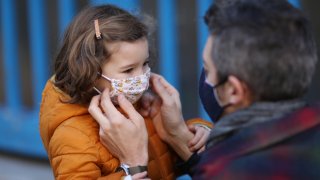
With some children still unable to get vaccinated against COVID-19 and masks coming off at several Illinois schools, many parents are wondering what symptoms they should watch for in children.
According to the Centers for Disease Control and Prevention, children experience similar symptoms to adults, and in many cases suffer from milder illness.
"While children are as likely to get COVID-19 as adults, kids are less likely to become severely ill," the Mayo Clinic reports. "Up to 50% of children and adolescents might have COVID-19 with no symptoms. However, some children with COVID-19 need to be hospitalized, treated in the intensive care unit or placed on a ventilator to help them breathe."
With the recent omicron surge that swept the U.S. earlier this year, hospitalizations of children were on the rise. In December and January, some Chicago hospitals reported their highest rates since the pandemic began, with even more than the previous delta surge.
"We are seeing twice as many kids in the hospital who are testing positive for COVID than we saw even back in our bad peak in September," Dr. Allison Bartlett, associate professor of pediatric infectious diseases at the University of Chicago, said at the time.
Many of those hospitalized, however, did not require intensive care and were unvaccinated or too young to be vaccinated.
In addition, Mayo Clinic reports babies under the age of 1 might be at higher risk of severe illness with COVID-19 than older children.
The symptoms present in children, like adults, can vary from several to none at all.
Mayo Clinic reports the most common symptoms in kids are cough and a fever. Possible symptoms include:
- Fever
- Cough that becomes productive
- Chest pain
- New loss of taste or smell
- Changes in the skin, such as discolored areas on the feet and hands
- Sore throat
- Nausea, vomiting, belly pain or diarrhea
- Chills
- Muscle aches and pain
- Extreme fatigue
- New severe headache
- New nasal congestion
Feeling out of the loop? We'll catch you up on the Chicago news you need to know. Sign up for the weekly> Chicago Catch-Up newsletter.
For some children, COVID-19 is only the beginning as some have been diagnosed with multisystem inflammatory syndrome following their infections.
"Evidence indicates that many of these children were infected with the COVID-19 virus in the past, as shown by positive antibody test results, suggesting that MIS-C is caused by an excessive immune response related to COVID-19," the Mayo Clinic reported.
MIS-C severely inflames certain organs and tissues, including the heart, lungs, blood vessels, kidneys, digestive system, brain, skin or eyes.
Possible symptoms of this condition include:
- Fever that lasts 24 hours or longer
- Vomiting
- Diarrhea
- Pain in the stomach
- Skin rash
- Fast heartbeat
- Rapid breathing
- Red eyes
- Redness or swelling of the lips and tongue
- Feeling unusually tired
- Redness or swelling of the hands or feet
- Headache, dizziness or lightheadedness
- Enlarged lymph nodes
Emergency warning signs of MIS-C include:
- Inability to wake up or stay awake
- Difficulty breathing
- New confusion
- Pale, gray or blue-colored skin, lips or nail beds — depending on skin tone
- Severe stomach pain
As for so-called "long-hauler COVID" or "long COVID," some children could also develop longer-lasting symptoms.
According to the Centers for Disease Control and Prevention, the condition appears less likely in children and adolescents, but some cases have been reported.
"The most common symptoms reported have been tiredness or fatigue, headache, trouble sleeping (insomnia), trouble concentrating, muscle and joint pain, and cough," the CDC reports.
Currently, children ages 5 and older are eligible to receive Pfizer's COVID vaccine. The Pfizer vaccine is currently the only treatment authorized in the US for children between the ages of 5 and 17.
Parents of children under 5 will need to wait until at least April, however, after Pfizer pulled its request from the FDA, citing the need to wait for data surrounding a third shot.
This week, new data posted online showed two doses of the Pfizer-BioNTech COVID-19 vaccine offer almost no protection against coronavirus infection in kids ages 5 to 11, but did offer protection against serious illness.
Researchers from the New York State Department of Health found that the vaccine’s effectiveness dropped to 12% from 68% in the age group in December and January when the omicron variant of the coronavirus began circulating widely in the United States.
The Pfizer shots still offered protection against serious illness from COVID, the researchers found, with protection against hospitalization declining to 48 percent from 100 percent over the same time period.

